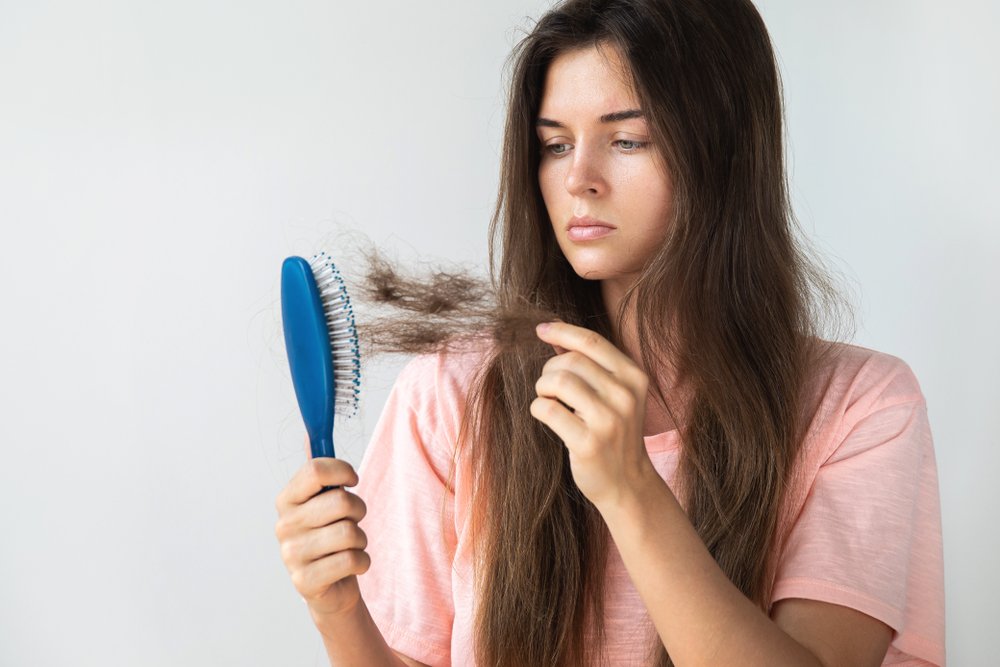In vitro fertilization (IVF) is a medical process in which sperm fertilize an egg outside the body. The fertilized egg is later inserted into the uterus for pregnancy. This process can cause direct or indirect factors that can lead to certain types of hair loss in women.
It is important to understand what is causing this hair loss during the IVF process. In addition to suspecting hormonal influences, it is also wise to get blood tests to rule out any other causes of hair loss, such as iron deficiency, before seeing a trichologist (hair loss specialist). Here are the possible causes of hair loss.
Unstable hormonal activity
The most common cause of hair loss during IVF is the stimulating effect on hormone production that is part of the IVF process. According to hair loss treatment specialists, diffuse hair thinning can occur. It causes the hair to become thinner all over the body, but there are no noticeable hair gaps on the scalp.
The hair system is sensitive to changes that occur in other parts of the body. This can cause a hormonal surge. Experts specify that in this case, on average 6 months after in vitro fertilization (regardless of whether it ended in pregnancy) the hair will return to normal.
If your hair loss is a result of the IVF process, ask your doctor for advice before you decide to stop treatment.
This is interesting!
Actress Gabrielle Union, known for “10 Reasons I Hate,” “Life as a Sentence” and “Invasion,” talks about how her hair began to fall out after several cycles of IVF. Union has a hair care line, but she struggled with hair loss while trying to get pregnant. Fans of the actress had no idea she had hair problems.
Union says that after each IVF treatment, a bald spot the size of a dime appeared on part of her head. Over time, the patches began to join together to form what she called a “bandage” on the front of her head and around the top of her head. After the reproductive treatment ended, the hair grew back. Although Union was unable to become pregnant, she and her husband used a surrogate and are raising the child.
Other factors that can cause hair loss

There are other causes that can cause hair loss during IVF.
Focal alopecia
This is another type of hair loss that can occur due to IVF-related factors other than diffuse thinning. This autoimmune disorder manifests itself as hair loss, leaving spleens all over the scalp. Pregnancy and hormonal changes are just a few provoking factors for this condition. If alopecia is not neglected, a drug with proven efficacy, minoxidil, can cause re-growth. However, the condition may recur in the future.
Interestingly, scientists recently found out: topical application of this drug does not help particularly effectively, but oral pills do cause hair growth. And surprisingly, the latest data show that even 1/40 of the previously prescribed dosage is effective.
Female-type hair loss
If you have this genetic condition, it may be caused by hormonal changes that occur in the body during IVF treatment. This can manifest as thinning of the hair on your head.
The good news is that this disease is treatable and hair loss can be stopped. It is also possible that the hair loss after IVF masked the onset of hair loss due to a genetic predisposition, meaning IVF treatment was not the cause.
This disease should be suspected if hair thinning started six months after stopping IVF treatment.
The presence of deficiencies
It is important to note that hair loss is not always a result of IVF, even if you are undergoing treatment at the time you notice hair thinning. According to professionals, hair loss in women is a sign of a metabolic-hormonal imbalance or an underlying nutritional deficiency that can cause thinning hair density on the head.
This can be checked with blood tests for basic indicators and thyroid function. Iron and vitamin D levels can be important markers: according to a study by the National Medical Research Center of Endocrinology, deficiency of this vitamin in Russian regions reaches rates of 84%.
Hormone gland dysfunction also influences the development of deficiency conditions. Thyroid hormone T3 is considered the most important hormone for metabolic function according to David Geffen School of Medicine scientists.
If your body is not healthy enough to support hair growth, you will have a hard time supporting the baby growing inside you. Because hair is one of the body’s most metabolically active tissues, it needs nutrients and hormonal support. This means that if these factors change, your hair will also come back to normal.
I have talked to many women who have consulted with me about thinning head hair, and they mention in passing the failed IVF procedure.
Since hair loss in women is almost always an indicator of an underlying nutritional deficiency or metabolic-hormonal disturbance, my consistent approach has been to assess causal factors in these areas. The pathology findings of each of these clients identified some aspect of the disorder that adversely affected their hair and (in my opinion) their ability to conceive.
Simply put, it is nature’s way of informing a woman that if her body cannot support the growth of her own hair, how can it support the development of another human being within her?
The human scalp hair follicles have a unique mismatch: hair is one of the body’s most metabolically active tissues; constantly growing and requiring sufficient, stable nutritional, metabolic and hormonal support to achieve this goal.
However, in those same terms, it is NOT an essential tissue for the functioning of the body, and it receives its nutritional, metabolic and hormonal support only when all the major tissues of the body, such as liver function, skin repair and muscle repair, are fully supplied. That is, the hair is nourished on a residual basis.
Common but often overlooked causes of infertility: inadequate amounts of iron, vitamin D, iodine, and thyroid hormone cofactors also affect hair growth. Zinc and selenium are the most important nutrients for optimal metabolic function.
Excessive hair loss or persistent thinning of hair density on is often an initial sign of an internal disorder or deficiency. What is my advice to patients?
Optimized thyroid function: T3 (active thyroid hormone – triiodothyronine), vitamin D and cortisol receptors must be balanced – and have the above nutrients at target levels to achieve optimal metabolic thyroid function. Then healthy hair growth will begin.
What we were able to achieve: once the underlying disorders were corrected, each client (as far as I know) regained the thickness of her head hair and became pregnant in a short time without any fertility interference. Some of these women have had one or two more children since I last saw them – and one even named her first son Anthony!!!
Sources
- https://www.healthline.com/health/pregnancy/bodily-changes-during
- https://www.novaivffertility.com/fertility-help/female-hair-loss-and-infertility
The articles on this site are for information purposes only. The site administrators are not responsible for attempting to apply any recipe, advice or diet, nor do they guarantee that the information provided will help or harm you personally. Be cautious and always consult a doctor or nutritionist!
*All products recommended by thefirstdoc.com are selected by our editorial team. Some of our articles include affiliate links. If you buy something through one of these links, you help us earn a small commission from the seller and thus support the writing of useful and quality articles.





